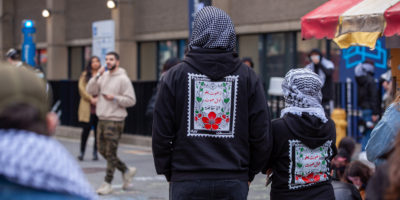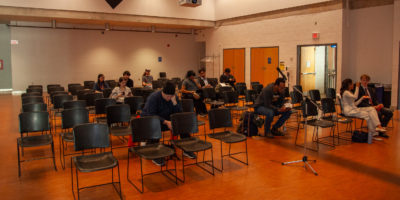In the October of 1980, Ryerson President-designate Brian Segal called the campus unsafe.
He labelled the Yonge and Gould block a dangerous eyesore, citing rapes, vandalism and constant thievery on and around campus.
He said the Yonge Street environment is dangerous for students because of the people it attracts to the campus are. There was no question as to the kind of people he was referring to – thieves, drug dealers and prostitutes.
But since the Yonge/Dundas redevelopment and local gentrification projects, prostitution has become less noticeable, though the downtown campus still attracts its share of the unseen element.
“[Prostitution hasn’t really raised itself (as much as) other crimes like assault and robberies,” said Lawrence Robinson, head of Ryerson security.
Detective Brian Berger of 52 division says the sex trade leads to dangerous streets. “Usually with the ho’s come the pimps and the drugs.” Still, both Berger and Robinson say Ryerson’s concern with prostitution has declined over the last 20 years. Back in the day, prostitutes frequented area parking lots.
The lot at Church and Gould Streets had a history of parked cars bouncing at night.
But surface lots are a dying breed and Ryerson is constructing a new engineering building on the Gould Street lot.
Even though the campus lies just south of one of the most dense prostitution areas in Toronto, few prostitutes actually come on campus. The women and men don’t technically work on Ryerson property – sidewalks don’t belong to Ryerson. The prostitute-heavy stretch from Carlton to Gerrard isn’t part of the university.
Dre is a neighbouring pimp. He talks about his women like a farmer talks about the best grazing lands for vows. He keeps his four hookers on the main roads, from Church to Sherbourne. The quieter streets that run through the university are non-starters.
“There’s not enough traffic,” he says. “People who are drunk (and looking for a woman) don’t look on a back road.”
But Ryerson student can’t ignore the sex trade flourishing down the street. First-year film student Laura DaSilva says, “some of my guy friends try to walk by them to see if they’ll go ‘hey babe.’” And Karolina Koubar, a third year engineering student, wants to see the prostitutes gone “because there are other ways to gain money,” she says. “It’s one of the main ways to get diseases. Also, it’s illegal.”
Nick, a sex worker who operates in Toronto, says that the biggest problems he has are not with diseases or the police, but with those who are scared of sex trade workers.
“People are afraid of us. I’ve met a couple of guys in my life. As soon as they know what you do they don’t want to know you anymore. I have to stay single.” he says. While Nick hasn’t had to deal with any bad situations so far, prostitution isn’t an easy profession.
Nick has to work with all kinds of people and dealing with mockery doesn’t help him.
“Every person is different,” he says. “You go to them or they come to you. They ask everything… You don’t expect what you’re getting.”
But not all Ryerson students are afraid or disrespectful. Some have good stories to tell about the people who work across the street.
Late last year, Trevor Brodie was visiting his brother in Neill Wycik when he got into a fight. He and the other man were drunk and their struggle landed them through the window of a nearby convenience store.
“I hid behind Neil Wycik,” he says. “I was really bleeding a lot at this time. That’s when a couple of female prostitutes came and said, ‘Are you alright?’”
Brodie was bleeding but the prostitutes came to his aid. “It was amazing how concerned they were. They pulled out some tissues. One had Band-Aids. They cleaned me up, made sure I was alright. Made me wait until the police were gone.
“I know prostitutes have a bad image,” Brodie says. But that whole night, the only people who stopped to help me were the people everybody trashes.”









Leave a Reply